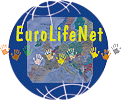|
Air pollution is causing alarming increases in respiratory diseases. Specially among children and other vulnerable population. To help policy makers justify difficult decisions on pollution, scientists need personal exposure data. But cost and lack of resources is preventing its large scale gathering.
Policy makers need also to raise awareness on air pollution, to gain citizen support to set in place good policies to curb pollution. Schools seek ways to raise the quality of learning through experimental science and promoting social responsibility, but finding the right approach to motivate students remains a challenge.
The EuroLifeNet Program brings it all together.
EuroLifeNet's objective is to build an innovative, cost-effective way to gather environmental scientific data, with citizen education via their direct participation in the data gathering, giving priority to young people. In a first pilot project, 600 highschool students gathered already data on personal exposure to PM2.5, using recent portable technology and protocols defined by scientists and experts interested in the data. We are now consolidating and expanding the program. Your contribution is valuable. You are welcome to contact us.
|
 Program Leader: CITIDEP Research Center on Information Technology and Participatory Democracy (International, HQ Lisbon, Portugal) [leaflet
Program Leader: CITIDEP Research Center on Information Technology and Participatory Democracy (International, HQ Lisbon, Portugal) [leaflet  ]
]